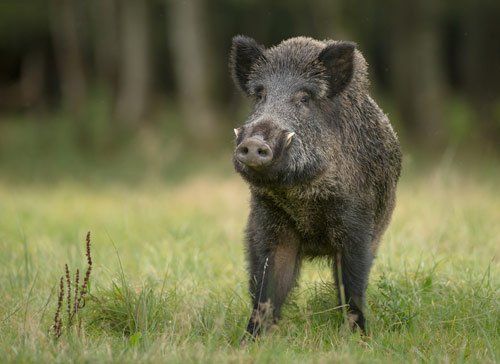Wild Hog Removal
Are wild hogs rummaging around your garden and ruining your plants and landscaping? It’s possible to exterminate wild hogs, but the cost is often prohibitive to homeowners. Call AAA Trapping
today to get an affordable estimate for wild hog removal.
Wild Hogs’ Lifestyle
Wild hogs are dangerous, destructive animals that cause over $1.5 billion of damage to agricultural and environmental sites each year. Wild hogs are now found in 45 states, including a downtown Decatur neighborhood.
These animals are highly intelligent and can easily adapt to a variety of environments, from deserts to freezing winters.
Although they look very similar to domesticated pigs, wild hogs are well adapted to surviving outside in the elements. They have thick, coarse coats of dark brown or black hair, short pointed ears, and can grow tusks 5-6 inches long. Most wild hogs reach around 100 pounds as adults, with some as big as 500 pounds. Due to their thick hides and large muscles, wild hogs are very powerful and are capable of running and swimming.
Although wild hogs can live almost anywhere, they tend to prefer forests as their natural habitat. These omnivores will eat anything from nuts and acorns to fawns and newborn animals. Wild hogs like to live in areas with dirt, so they can dig muddy wallows to splash around in to keep cool and to ward off bothersome insects. Wild hogs are social creatures and tend to live in groups, called “sounders”. These groups usually rest during the day in dense vegetation and wait until dusk to venture out for food. Older adult hogs are more independent and typically range over an area of one to two square miles. They reserve social interactions for the mating season.
Damage Caused By Wild Hogs
Wild hogs do not typically enter homes, but they will root through yards and gardens at night looking for food. Hogs that have been previously trapped and got away are generally wary of humans and will shy away from them and traps.
In their search for food, wild hogs will tear up the ground and remove saplings, seedlings, and new crops. They will trample through vegetation in crop fields and leave areas looking plowed up by digging in and turning over the ground looking for roots, nuts, grubs, and other food in the soil. Wild hogs also pose a danger to farmers who have livestock because they are known to eat newborn calves, lambs, and piglets.
Wild hogs also carry a variety of transmittable and zoonotic diseases, such as E. coli, that can affect humans as well as other animals they come in contact with. They can be aggressive and may attack with little provocation, especially if they have young they are protecting. Older adult hogs are especially threatening as they can charge hunters and slash them with their tusks.
Wild Hog Prevention
If you live in a rural area, you can prevent wild hogs from entering your property by installing pig-proof fencing around the perimeter. You may also want to keep guard animals around, such as sheepdogs, to watch over your vulnerable livestock. If you live in an urban area and are unable to install fencing, you should take precautions to vaccinate all pets and domestic animals against common diseases carried by wild hogs. If you encounter a wild hog while out on your property, try to climb up high, such as in a tree, as wild hogs are not good climbers.
Safe Wild Hog Removal
Many states encourage the hunting of wild hogs to reduce the population. However, hunting is not typically an effective or viable strategy in wild hog removal, especially in an in-town neighborhood setting. Homeowners experiencing issues with wild hogs on their property should call a certified, experienced wild hog removal specialist with the training to oversee the process knowledgeably and professionally.
AAA Trapping has wild hog trapping and removal experience. Call us today at 770-995-0803
or contact us online to set up an appointment to evaluate your situation. We even offer same-day service



